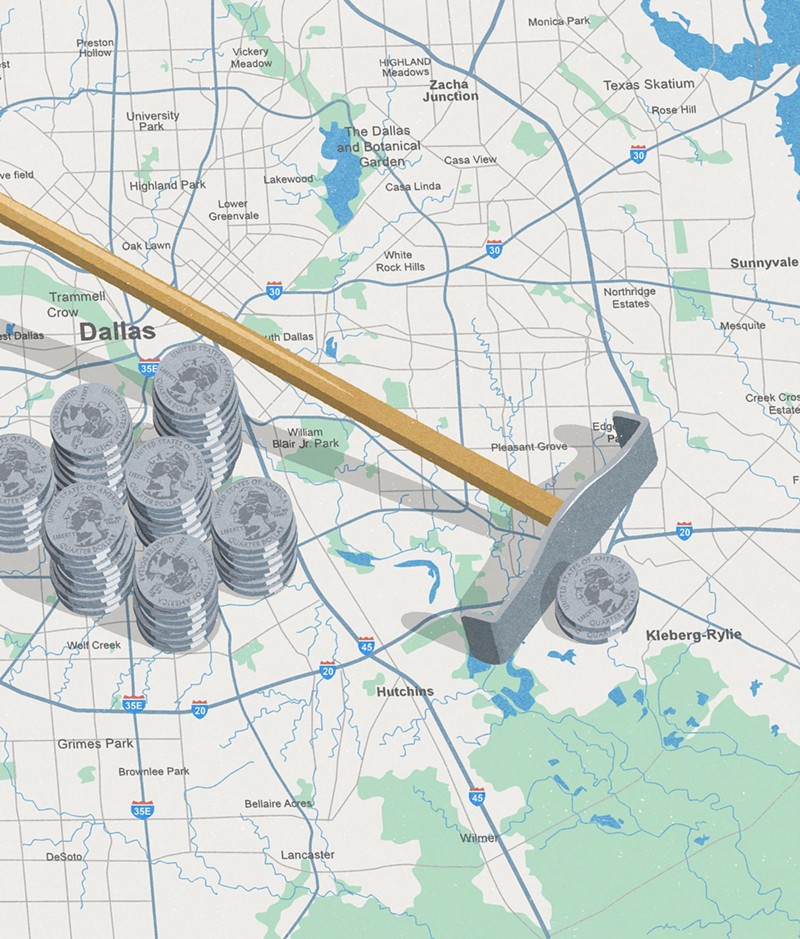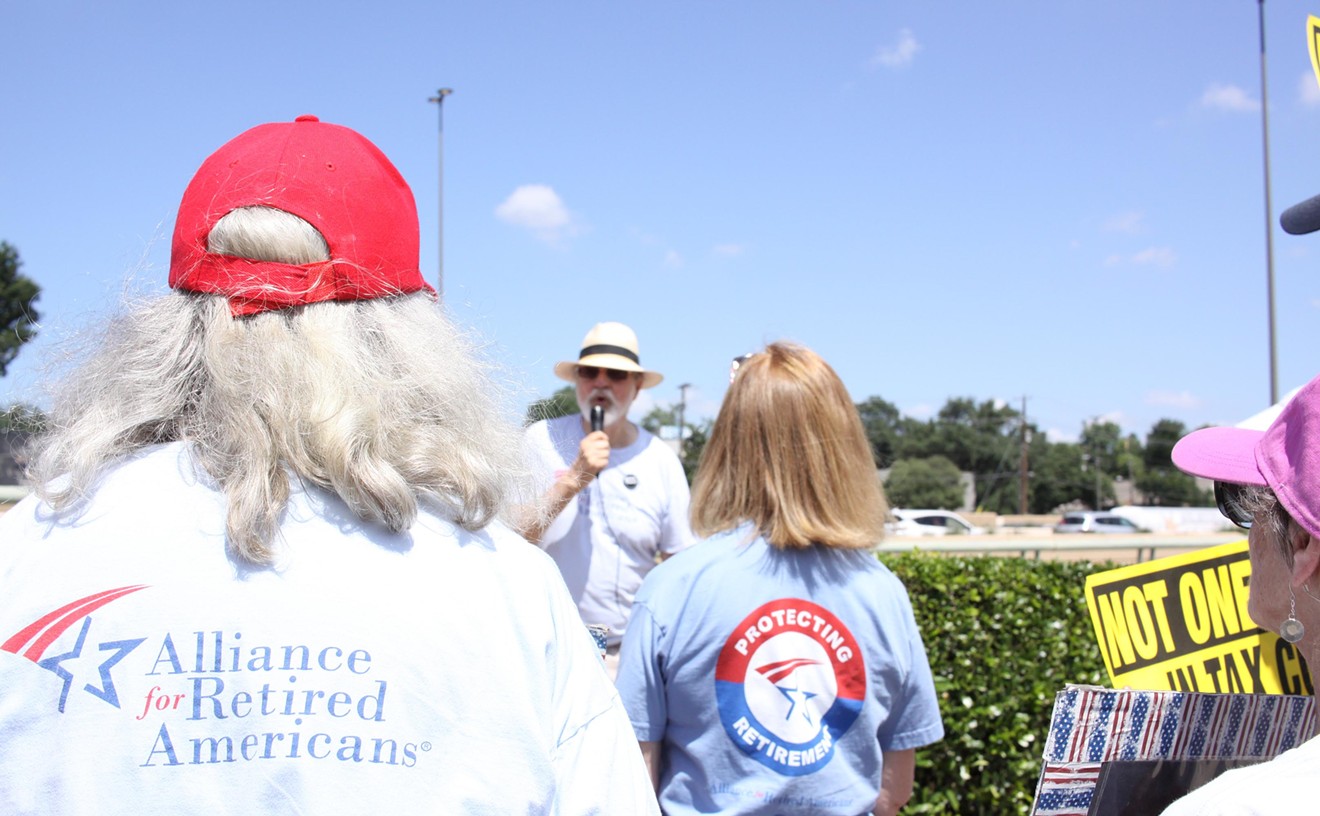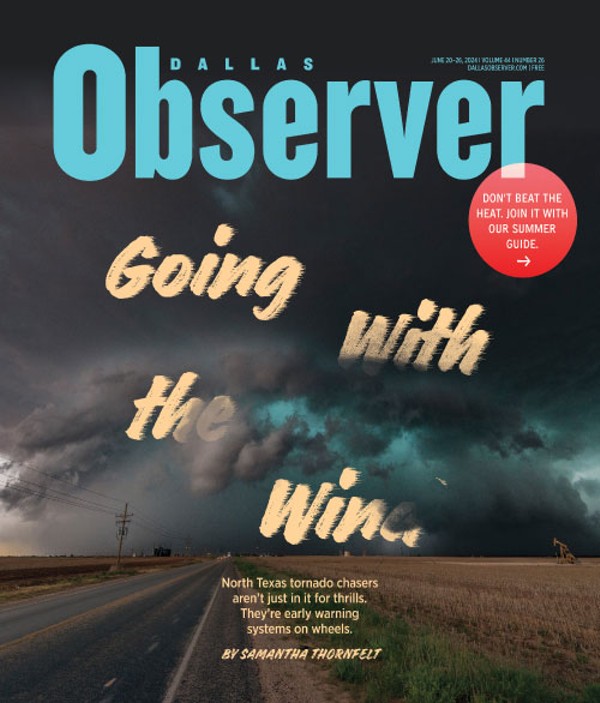Every month, residents in the community turn out to the Kleberg-Rylie Recreation Center on Ed Road to get updates from city staff and police and to air their many grievances. It’s almost always the same. They complain about neglect, bad roads, lack of sidewalks and illegal land uses. They say police and code enforcement can’t take the time to go out there, and they’re the unloved stepchild of Dallas.
The frequent targets of their complaints — City Council member Tennell Atkins, police and city staff — seem almost just as frustrated with the lack of progress in Kleberg-Rylie. Atkins says he spends a disproportionate amount of his time dealing with the community’s problems, but the city has only so much money. More redevelopment could help with the infrastructure problems, but if that happened the people who live there now might not be able to afford to stay.
So Kleberg-Rylie seems stuck in a place that’s not quite country and not quite city. Call it Conundrumville.
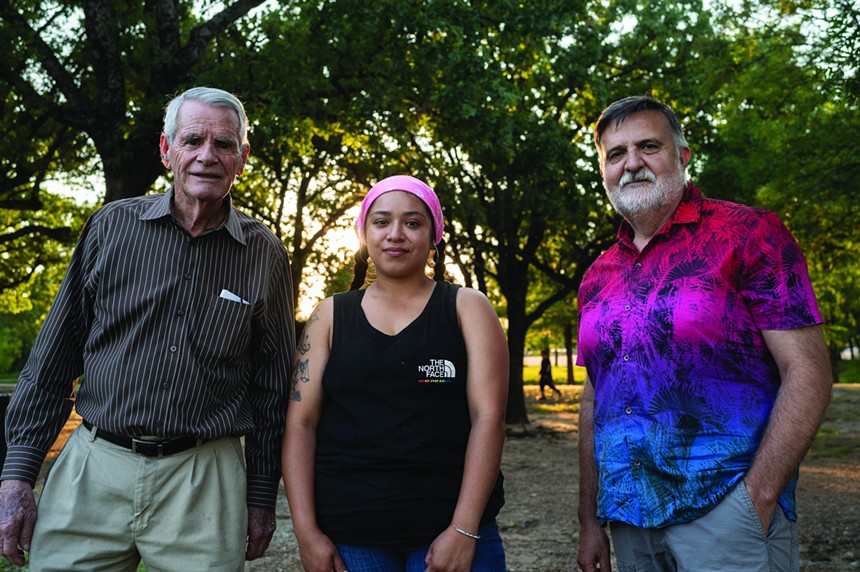
Bill Freeman, 83, Jessica Ramirez, 30, and David Carranza, 60, are among Kleberg-Rylie residents seeking more city support for their part of town.
Mike Brooks
Never Give Up
At this month’s meeting, representatives of the Dallas Police Department and code enforcement office shared with about a dozen residents just how hard it can be to get anything done in the city, let alone in Kleberg-Rylie.Officer Bryan Joseph of the DPD acknowledged that police may not always show up when residents call, but he urged the community to keep calling. If they don’t report crime, the crime statistics for the area won’t be accurate, and it may not get the resources it needs.
Joseph said police get many calls from residents in the area about loud music and gunfire, and he acknowledged that sometimes police dispatchers get frustrated with residents for calling. Joseph said to ask for a supervisor if this happens or if police don’t show up.
David Carranza, 60, president of the Kleberg Neighborhood Association and Crime Watch, who was running the meeting, chimed in, stating that he’s never been contacted by DPD after reporting a crime. But he knows he just needs to keep dialing.
“It’s a pain in the butt,” he told the group. “Sometimes they don’t work. Police don’t show up. Whatever it is. You’ve just got to bite your tongue and keep calling.” Bill Freeman, 83, a longtime resident of the area, said the outer parts of Kleberg-Rylie can sound like a warzone from all the gunfire. Some of it even sounds like it’s coming from automatic weapons. At times, it’s easier just to look the other way, he said.
In May, there were just over 500 code violations recorded in Kleberg-Rylie, Doyle Lawhon, a code officer with the city, told the group. They mostly have to do with high weeds, littering and illegal land uses.
“Illegal dumping is a huge problem,” he said. “It’s a nationwide problem.” If there are incidents of illegal dumping on someone’s property, but they don’t have any evidence of who did it, it’s on the property owner to clean it up, he explained. That’s why he encourages residents to get cameras for their properties to catch people in the act.
Marcus Wood, 83, a Dallas resident who has advocated for Kleberg-Rylie over the years, had a question for Lawhon: “Why are we not seeing any progress?”
“I’m going to be honest, probably too honest,” Lawhon replied. He then gave an example from South Dallas to explain how hard it can be to get things done. A code officer called him about a car blocking an alley. “He’s like, ‘Well, who do I call?’ Lawhon said. He told the code officer to call parking enforcement. Parking enforcement came out and said it wasn’t its job to deal with this car blocking the South Dallas alleyway. So, he called DPD. The department said that’s not its job either.
“So, I said, ‘Both people are giving you the runaround. Send an email to management,’” Lawhon recalled. “That was two or three weeks ago, and I have yet to hear back.” He continued: “Unfortunately, there’s just issues, and they need to be resolved. That’s why I tell people, man, send an email. Send an email. Make someone pay attention, someone higher up.” He said it took about six or seven months just to get a couple of leaky fire hydrants in the community fixed. But, he stayed on it and made sure it got done.
A bit of progress for the community can be found in a lawsuit recently filed by the city. It’s going after an auto scrap yard that the city says has been operating illegally for some time.
The scrap yard is operating without a certificate of occupancy on land zoned for residential and agricultural purposes, but that didn’t stop the owners from crushing and storing cars there. A waterway cuts through the property, and vehicle parts, debris and chemicals from vehicles have all ended up in the water.
Part of the property is in the city, and the rest is in the county. This has made it more difficult to go after the business, another common issue in Kleberg-Rylie. But the city goes beyond alleging illegal land use. It says in court filings that the property is being used to store, dismantle and crush stolen vehicles. The dismantling and crushing process causes large amounts of spillage of gas, oil and possibly other hazardous liquids that have discolored the soil.
Recent storms left the property saturated with large pooling areas of water mixed with gas, oil and other unknown pollutants. The city is asking the court to shut the business down. The owners of the property have not yet addressed the allegations in court and didn’t respond to a request for comment.
For some, the actions by the city are too little, too late. Carranza said he’s been trying to get this property dealt with for the last four years.
About a month ago, six people gathered at a picnic table outside the Kleberg-Rylie Recreation Center. Carranza, Wood and Freeman were joined by Theodore Wojtowicz, 72, Jessica Ramirez, 30, and Monica Guardado, 48. Wojtowicz and Ramirez are residents of Kleberg-Rylie and Guardado’s late father used to live there. They have a hard task: getting anyone they can to care about Kleberg-Rylie.
A stroll through the community reveals many mobile homes, some fixed up, some breaking down, along with single-family houses and ranches with cows, chickens and horses. The area has some big development creeping toward its doorstep.
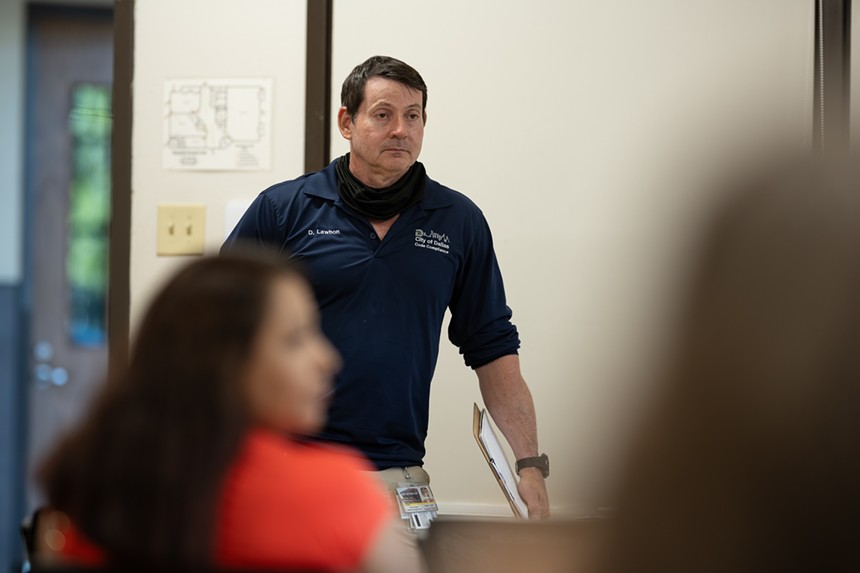
Dallas code officer Doyle Lawhon tells Kleberg-Rylie residents about the code violations in the community.
Mike Brooks
A Once-Booming Community
The community is just south of Balch Springs, southeast of the intersection of Lyndon B. Johnson Freeway and U.S. Highway 175. Kleberg-Rylie was born in the 1840s, as two neighboring farming communities. Kleberg boomed after the Texas Trunk Railroad made Kleberg a stop in the 1880s. It was platted in 1899 and later served as a home to people attempting to build locks on the Trinity River. In 1908, a devastating flood washed away the locks on the river, and the project was withdrawn as unfeasible, according to the Texas State Historical Association.The town grew to have two steam saw and grist mills, a cotton gin, two wood dealers, two livestock dealers, a blacksmith, a shoemaker, two general stores and a newspaper called the Kleburg Pigmy. (The spelling of the town’s name changed over the years until it finally settled on Kleberg.) The downtown area of Kleberg was destroyed by a fire in 1920, and only portions were rebuilt.
The community’s population varied from a few hundred during most of its existence to more than 4,500 just before being annexed by Dallas. The town incorporated in 1956, when it started providing water and fire protection to its residents. At the time, it was the largest town in the state without a property tax. But increased rates for electricity and other services crippled the town.
In October 1977, the mayor of the town threw his support behind joining Dallas, and the question was put to the voters the following year. The final tally was 559-342 in favor of merging, and Dallas annexed Kleberg-Rylie in April 1978. Back then the area had a mostly white population. These days, it’s made up mostly of Hispanic, Black and Native American residents.
As of 2020, there are about 25,867 people in the ZIP code in which the Kleberg-Rylie Recreation Center sits, according to the U.S. Census Bureau. In 2022, the area median income was just over $51,642.
Wojtowicz moved in 11 years after Kleberg-Rylie became a part of Dallas. He’s a utility contractor who wanted some land where he could store his machinery. He started with 20 acres and today has about 13. “It’s a lot to take care of for me,” he said. “I’m getting older.”
But Wojtowicz is there to stay, despite the problems. “We made it ours,” he said. “We made life work here.“Life’s experiences show you that if you don’t speak up, nothing gets done.” – Kleberg-Rylie resident Bill Freeman
tweet this
“All my neighbors, I get along with really good,” he said. “I don’t have any problems. In fact, we’ve said if there’s problems, call me, I’ll come back you up, you know, if you got a criminal or something there, because the cops take too long to get there.”
Wojtowicz is hoping that as the area becomes more developed the city will decide to put a police substation there so response times can be quicker. The nearest substation is about 8 miles away.
One of the worst things about Kleberg-Rylie is the roads, he said, and they’re not getting any better, even with more development. “They’re building houses to meet demand, and they’re not building the roads to meet the traffic they’re going to be loaded with,” Wojtowicz said. “In fact, the roads are so bad, you’ve got to drive at 20 miles an hour on some of them or you’re going to wreck your undercarriage.”
Wojtowicz and others believe there are too many mobile homes in Kleberg-Rylie. Some locals estimate that 85% of the mobile homes in Dallas County are in Kleberg-Rylie, although the Observer can’t confirm that figure. Wojtowicz said these homes don’t count as traditional rooftops when developers consider building stores or other businesses, so they never get built there. Carranza often drives to Balch Springs or Seagoville to do his grocery shopping.
Wojtowicz said that when he and others, like Freeman, were more active in the community, they got things done. But since City Council member Tennell Atkins was elected, Wojtowicz said he’s felt disenfranchised and neglected. (Atkins said that’s not the case at all.)
Freeman has lived in Kleberg-Rylie for decades. His house is 104 years old and was owned by the last mayor of Kleberg before the community was annexed. “We just love it out here,” Freeman said. “This is our home, our community.”
He used to own a little weekly newspaper called the Suburban Tribune that would cover all the happenings in Kleberg-Rylie and the surrounding area. The publication could sometimes build momentum around getting things done.
As Freeman and Wojtowicz saw the area developing, they decided to form a coalition to advocate for the community. They stopped a sewage plant and an airport from being built in the years they were active. Most recently, they stopped a concrete batch plant from setting up shop on Kleberg Road. They didn’t want the heavy trucks from the plant rolling down their already crowded roads.
“Life’s experiences show you that if you don’t speak up, nothing gets done,” Freeman said.
Wojtowicz first got heavily involved in the community when a new trailer park was proposed for land behind his house. He got about 100 people to sign a petition against it. “I won the war,” Wojtowicz said. “I stopped them.”
Now, there are traditional homes behind his plot of land.
“That’s what kind of pulled us all together in the beginning, was having a little bit of a say about what went where and what the quality of it was,” Freeman said. Now that they’re getting older, Freeman and Wojtowicz are relying on people like Ramirez and Carranza to carry the torch.
Ramirez, who lives in a mobile home, doesn’t want any more trailer parks in the community either. “Mainly, the big reason is, it’s a private-owned sector,” she said of the parks. “So, they make the money. They own the property. We just pay rent. It’s not a good type of housing, I would say. It’s a transitional housing.”
She stays in Kleberg-Rylie partly because she feels she doesn’t have the means to leave. “My parents moved back to Mesquite, and I stayed because there’s no way for me to get out, if that makes sense,” she said. “They keep raising the rent.”
Carranza said development has been creeping toward Kleberg-Rylie’s doorstep for years. He wouldn’t mind it so much if the city did some work on the community’s infrastructure so that it could support this growth. “It is chaotic, but they’re not making the road stronger,” he said.
The roads can get so backed up that it takes 30-45 minutes just to drop off the kids at schools in the neighborhood.
There are also few sidewalks. “Putting all this stuff into Kleberg and not giving us economic development is a big thing,” Ramirez said. “It’s just not fair.”
Carranza said many of the mobile homes in Kleberg-Rylie are falling apart because homeowners don’t have the money to fix them up. He thinks the city has programs to help traditional homeowners, but nothing specifically for mobile home owners. “It’s sad,” Carranza said. “They’re keeping these people down because they’re in a mobile home.” Ramirez said many Kleberg-Rylie residents have lost hope.
“They’re not speaking up because they just feel like there’s no point,” she said. “They feel like they don’t matter, and Dallas has done a good job of making them feel that way, making it seem like they don’t matter.”
Guardado doesn’t live in Kleberg-Rylie, but she owns land there that once belonged to her father, who died about a year and a half ago. She’s now speaking up for her late father. “People here have been neglected, misused and mistreated,” she said.
Because her father’s land is in a flood plain, she can’t build on it without acquiring special permits. Before her father died, a homeless encampment on city property spilled over onto his land. He called code enforcement. He called the police. But both said they couldn’t do anything. “Even though they came out, I’m still told that because it’s private property, it’s my job to clean it,” Guardado said. It took a lot of fighting to get the homeless off her father’s land.
“I think people here are very hopeless, and I think they just wait for a miracle to happen,” she said. “I know I do.”
She and the others wonder why Atkins doesn’t do more to advocate for Kleberg-Rylie. “It just makes me so mad,” Guardado said. “Why can’t the people here get the same treatment? It’s equal. They live here. They pay taxes. They pay bills. What’s the problem? No one wants to outreach and come help, and it’s sad.”“They feel like they don’t matter, and Dallas has done a good job of making them feel that way, making it seem like they don’t matter.” – Kleberg-Rylie resident Jessica Ramirez
tweet this
Carranza is on one of the steering committees for ForwardDallas, the city’s latest comprehensive land-use plan that’s in the works. There are plans for Kleberg-Rylie in ForwardDallas that seem promising. For example, it calls for natural areas to be integrated into developments in the community to act as a natural buffer between residential spaces and more intense development. It also calls for creating a well-connected network of streets with an emphasis on linking residential areas with nearby commercial centers. But Carranza worries these plans will only fade into nothing like previous schemes such as the West Kleberg Community Plan, which was passed by the City Council in 2007 but seems to have been forgotten.
Carranza moved to Kleberg from Oak Cliff about four years ago to get away from urban life. He likes that Kleberg-Rylie is more rural and hopes it stays that way. Despite the complaints of gunfire and loud music, he finds it generally peaceful. “It’s like a whole different thing. That’s why I got involved.”
That’s when he met longtime residents Freeman and Wojtowicz. “I started getting pissed off,” he said. “These people have been fighting for 20 years, and they’re getting older.” One thing Kleberg-Rylie residents are trying to do is get a trail running through the community. "This trail has been on the plans since 2007," Carranza said, but it has yet to be built.
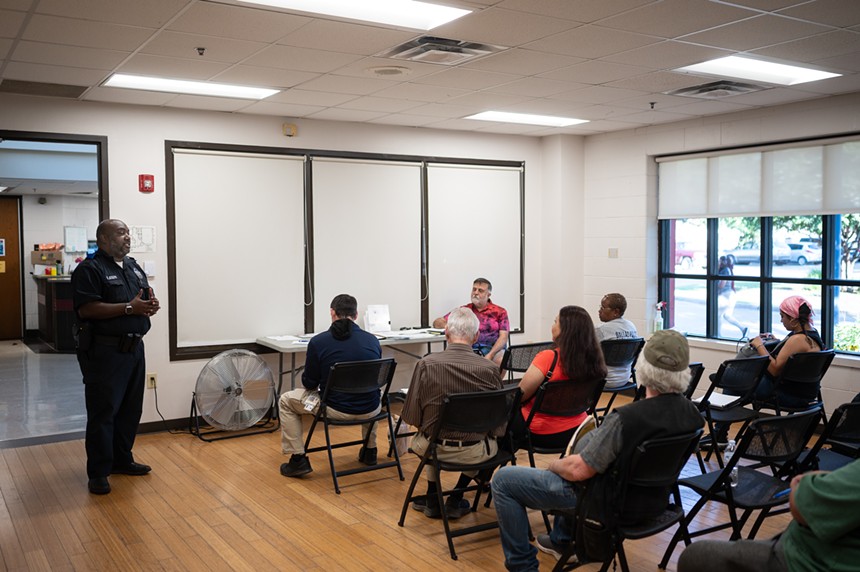
Dallas Police Officer Bryan Joseph tells Kleberg-Rylie residents to keep reporting crime even if the cops don’t show up when they call.
Mike Brooks
Carranza said he’s been an activist since he was a kid. These days, his cause is the betterment of Kleberg-Rylie. “Things have to start happening,” he said. “We have a beautiful area out here, but the city’s allowed it to be ruined.”
Trying Times
Atkins says he is just as frustrated about the issues facing the community, and he defended his leadership passionately. He had his office send a plethora of flyers to Kleberg residents about various events he’s held in the community over the last few months.Atkins said he just cannot please everyone. “I spend a majority of my time in Kleberg-Rylie because it’s a rural area,” he said.
According to the council member, apartments have been placed in the community, some streets have been repaired and the rec center has been redone since he was elected. Half of the gym at the rec center is closed because the floor is damaged, but Atkins said the city just recently found the funds to get it fixed. He said he’s brought the police chief and fire chief out to the community, as well as code enforcement. He’s held meetings there about the budget, the 2024 bond package and ForwardDallas. He said he’s done a lot for Kleberg-Rylie over the last 15–20 years.
“Is Kleberg-Rylie better off than when I started? Yes,” he said. “I’ve got passion for Kleberg-Rylie because, No. 1, all they’ve got out there’s a rec center.” He said it’s just the small group of people we spoke to who are complaining about his leadership. “And I wish the Dallas Observer would come to my town hall meetings. Then you’ll know what’s going on in Kleberg-Rylie,” he said.
He said he’s put millions of dollars into the community, but he has 53 square miles in his district to watch out for. “I get $25 million for infrastructure,” he said. “Everybody [on the council] gets $25 million, and I’ve got 53 square miles, and some have 10 square miles.” At this rate, he said, “I’ll never catch up with equity.” He said he can’t do anything about the lack of restaurants and shops in the area because developers go where they want, and they’re not ready to be in Kleberg-Riley. But he said he’s always done what he could.
“I’m very passionate about Kleberg,” he said. “When I first ran back in 2007, I spent 90% of my time in Kleberg-Rylie because they feel like they did not have a council member representing them. I’ll be darned if someone says I don’t represent Kleberg-Rylie.”
He said he wishes the city would give him more money for infrastructure in his district. Maybe then he could bring more fixes to the community. “They’re still on septic tanks out there,” he said. “But I don’t have the money. I use what they give me. … It’s a rural area. It’s very difficult, but I do not have enough resources.”
Atkins said he wishes people in Kleberg-Rylie would go downtown and tell the City Council what they need. Better yet, they can stop by his District 8 office, he said. “Kleberg-Rylie is my No. 1 priority. It’s always been my No. 1 priority,” he said.
The community needs more resources, but so does the rest of his district. “We could send all the code officers in the city of Dallas out there and you still won’t resolve all the problems,” he said.
“People who call me, we respond, especially in Kleberg-Rylie because we know they feel like the stepchild to the city of Dallas,” Atkins said. “But, like I said, I cannot make everybody happy in Kleberg-Rylie.”
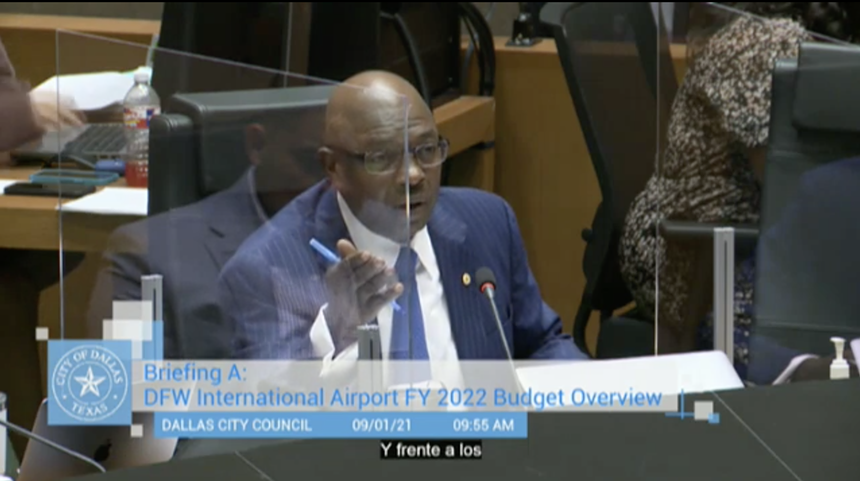
Dallas City Council member Tennell Atkins says he devotes much time and energy to working on issues in Kleberg-Rylie, but the city has limited money.
City of Dallas
Chickens and Eggs
Try as Atkins might, the economics and rules influencing how land is developed make Kleberg-Rylie’s problems especially knotty.Professor Cullum Clark, director of the Bush Institute-SMU Economic Growth Initiative, said Kleberg-Rylie is in a bit of a conundrum.
Generally speaking, North Texas is good at developing rural land, and that includes infrastructure. But things are a bit different in the city limits, Clark said. For one thing, the land in Kleberg-Rylie isn’t that desirable for developers yet. “Therefore, the kind of classic economics that develops new land aren’t operating very powerfully there,” Clark said.
On top of that, there’s just a lot of extra red tape in Dallas that might slow development down. Dallas’ permitting office has been exceptionally slow in turning around building permits, for example.
“I think it’s important to note that there is a real difference there because like in Prosper or Celina, they are, today, growth machines in a way the city of Dallas may have been … 30 or 40 years ago,” Clark said.
There’s probably some desire by the city to keep the area affordable, as well, which presents challenges to bringing more development and infrastructure. In Prosper and Celina, areas are being developed for middle- to upper-class residents. In these cities, developers absorb most of the costs of building streets, sidewalks and sewers and price homes accordingly.
Trying to build with affordability in mind, especially in an area that’s already partially built out, presents extra obstacles.
“The numbers won’t work for a developer,” Clark explained. “So, now the infrastructure would have to be paid for by city government, but city government doesn’t have any spare dollars. So, you see how it’s kind of a different economic problem in a mature place.”
With many renters in the area, displacement could also be an issue if much development comes to Kleberg-Rylie. If nothing new gets built there, displacement won’t be a problem, but then no new money would come into the neighborhood to support its infrastructure needs. “So, that’s kind of a tough situation,” Clark said.
Still, community advocates try. Carranza said he’s toyed with the idea of running for City Council to represent the community, but he’s not quite ready yet.
“I’m just learning all of this stuff now,” he said. “But if someone doesn’t come in this next time that is going to work with this community, then I feel like I have no choice but to do something.”
Carranza said he recently sent a letter to every City Council member and the mayor about the community and some of its grievances. Not one responded, he said. Now, he’s working on another letter to invite the City Council and mayor out to the community to see their problems first hand. He’s still working on the details, but he’s hoping for a big turnout. If the City Council doesn’t show up, it’ll just prove his point: The city of Dallas doesn’t care about Klerberg.
A retired real estate agent, Carranza said advocating for Kleberg-Rylie is now his full time job. “I don’t get paid but, hey, it’s my neighborhood,” he said. “I came here to retire, to have a nice time, to enjoy my chickens and my cows, and to have a good life. That’s what I’m here for.”

